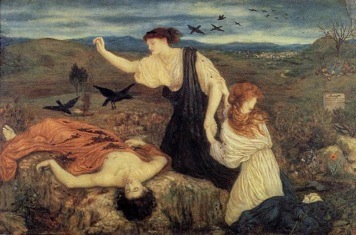Antigone


Antigone




The Plot
Antigone opens before the palace at Thebes in the aftermath of the defeat of Polynices and his companions’ attempt to take the city from the tyrant Creon. Creon has published an edict stating that no one shall give burial to the corpse of Polynices under pain of death. Antigone is the daughter of Oedipus and the sister of Polynices. Despite the edict and the advice of her sister, Ismene, Antigone performs the symbolic rite of burial over her brother by sprinkling dust over his corpse. She insists that Creon’s edict cannot negate the unwritten laws of the gods and oikos that demand that the appropriate family rites be performed upon the dead. Creon demands that the edict stand, and sentences Antigone to death. The prophet Tiresias warns Creon that the gods are angered by Creons act, and by the pollution which is derived from the unburied corpse. Creon at first insists that the laws of the state, which he personifies, trump the traditions of the oikos, but under pressure from Tiresias and the chorus (citizens or elders of Thebes), the tyrant relents and hastens, first, to bury Polynices, and then to release Antigone. But he is too late in the latter case, as Antigone has hanged herself. Haemon, the son of Creon and fiance of Antigone, stabs himself by the corpse of his beloved. Upon hearing of the death of her son, Creon’s wife Eurydice, commits suicide as well.
Some Observations
This play is perhaps the most admired of Sophocles’ plays, but the admiration often rests on a misunderstanding. Usually, Antigone is regarded as a noble martyr and Creon is seen as a bone-headed cruel tyrant. This is because of an assumption that Antigone is a self-sacrificing heroine who, in the parlance of modern politics, “speaks truth to power.” But, Athenian viewers, held a very different set of assumptions. The principle that Antigone defended and the principle defended by Creon were of equal validity. Sophocles may have favored Antigone’s assertions slighly more than Creon’s, but the contemporary idea that the heroine is absolutely right and that Creon is completely and ignobly wrong, or that Antigone is “speaking truth to power,” presents a overly simplistic and ridiculous view of this masterpiece. In fact, this oversimplification turns the play from a high tragedy into a melodrama. In point of fact, the play represents a balanced discourse between the power and needs of the state and the traditions and ritual requirements of the family — a conflict between polis and oikos.
Creon commits a terrible act as a result of an extreme provocation. Polynices, a native of Thebes, attacked the polis of his birth. As a Theban, he committed a foul treachery. He was a traitor who would have destroyed the state. Creon stands for the respect and allegiance that is owed to the community and he exacts a penalty that he believes justifies the crime. Thebes owes traitors no respect, no niceties or rituals, to mark the death of those who would bring down the state. Athenians of the period would have understood Creon’s command, and would by no means have condemned the tyrant.
Antigone represents the traditions of the family that require that the women of the oikos prepare the body and direct the rites of death. She comes from a family whose bonds are so strong that they have become incestuous, a paragon of the corrupt oikos. Antigone herself refuses marriage in life, and instead goes to meet her brother in death. Like Antigone and her family, the oikos of mid-fifth century Athens had already become, to a great extent, no longer the dominant social institution, replaced by the requirements of the polis. Antigone represents the ways and traditions of the oikos, and thus of the past.
The play presents the primary tension between household and state that can be summed up thus:
 Creon argues, “I am right to punish the corpse of a traitor; but am I justified in killing others who would ignore or thwart my just punishment, and am I right to stand against the gods and the people of Thebes, as well?”
Creon argues, “I am right to punish the corpse of a traitor; but am I justified in killing others who would ignore or thwart my just punishment, and am I right to stand against the gods and the people of Thebes, as well?”
 Antigone’s justification goes, “I am right to show love and pity to my dead brother. I am right to enact the rights that the tradition of the family places upon me as an inescapable duty; but, am I justified in ignoring the commandments of my polis?”
Antigone’s justification goes, “I am right to show love and pity to my dead brother. I am right to enact the rights that the tradition of the family places upon me as an inescapable duty; but, am I justified in ignoring the commandments of my polis?”
As each disputant states their case to us, if we concentrate, we will begin to discover that, while each may have a legitimate case, both are intractable, illogical and, just plain pig-headed! Creon is unwilling to compromise, even when the people and the gods declare his position unwise and a danger to the state that he pretends to protect. By waiting too long, Creon loses all that is dear to him. The more Antigone argues her case, the less logical she becomes, and the more we begin to suspect that she has no legitimate, strongly-held reasons for her behavior; she is acting on instinct and out of the same pig-headedness that afflicts Creon. So, what does the play say about the proper balance between household and state — between oikos and polis? That will be our topic of discussion.

